Is It Legal to Use a VPN for Crypto Trading? Risks and Considerations
Table of Contents
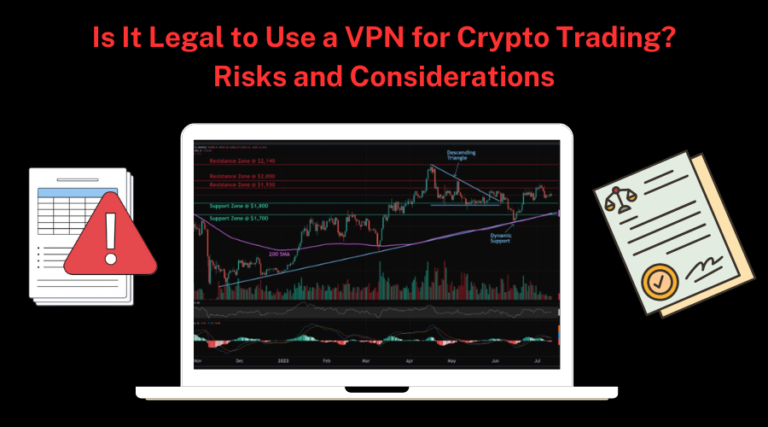
In the world of crypto trading, accessibility, security, and privacy issues are becoming more common. As digital currencies like Bitcoin and Ethereum grow in popularity, so do the risks associated with trading them. Many traders use VPNs to protect their online activity, bypass geo-restrictions, and stay anonymous.
However, with these benefits, there are also some very important questions people have to ask themselves, like, Is it legal to use a VPN for crypto trading? What risks should you be aware of? And how do you set up and use a VPN effectively for your trading needs?
In this article, we’ll explore the legal aspects of using VPNs for crypto trading, outline the potential risks, and offer a step-by-step guide on setting up and using a VPN safely.
From trading on popular exchanges like Binance, Bybit, Coinbase, kraken etc to using decentralized platforms, this guide will help you understand the potential legal implications involved, set up your VPN correctly, and take further steps to improve security and privacy in trading.
How to Use a VPN for Crypto Trading?
Using a VPN for crypto trading is a simple process. Still, setting it up correctly is crucial to ensure your privacy and security. Here’s a step-by-step guide on how to get started
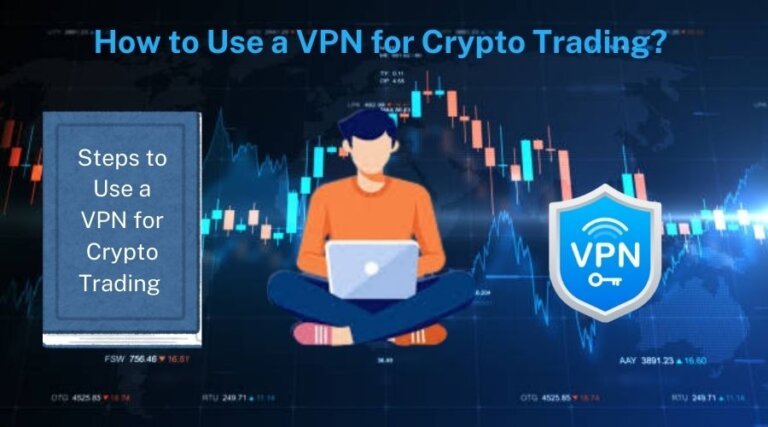
Step 1: Choose a Reliable VPN Provider
Select a VPN that offers strong encryption, a no-logs policy, and a large network of servers. For added security, look for features like a kill switch, DNS leak protection, and MultiHop (Double VPN). Popular choices include NordVPN, Surfshark, and ExpressVPN.
Step 2: Install the VPN on Your Device
Download the VPN app from the provider’s official website or your device’s app store. Install the app on all devices you plan to use for trading, such as your computer, smartphone, or tablet.
Step 3: Set Up Your VPN
Open the VPN app and follow the setup instructions. Typically, this involves logging in with your account details, choosing your preferred security settings, and allowing necessary permissions.
Step 4: Connect to a Secure Server
Choose a server location that best suits your trading needs. For example, select a server in a country where your preferred crypto exchange is accessible. Connecting to a server near your location can also help maintain fast speeds.
Step 5: Enable Key Security Features
Ensure to activate essential security features like the killswitch, which automatically disconnects your internet connection if the VPN connection drops. This prevents accidental exposure of your real IP address.
Step 6: Start Trading Securely
Once connected, you can access your preferred crypto exchange and start trading. The VPN will encrypt your traffic and mask your IP address, enhancing your privacy and security throughout your trading session.
Best Practices for Using Vpn for Crypto Effectively
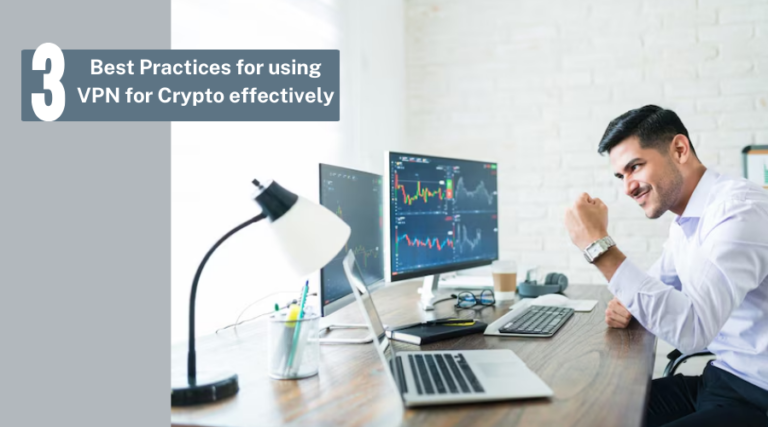
- Regularly Update Your VPN: Keep your VPN software updated to benefit from the latest security patches and features
- Avoid Public Wi-Fi: Public Wi-Fi networks can be risky, even with a VPN. If you must use them, ensure your VPN is active and that security features are enabled
- Check VPN Compatibility: Ensure your VPN is compatible with the exchanges you use, as some platforms may have restrictions or detect VPN usage.
Using a VPN correctly can significantly enhance your crypto trading experience by providing the privacy and security needed in the ever-evolving digital market.
Legal Considerations and Risks of Using VPNs for Crypto Trading
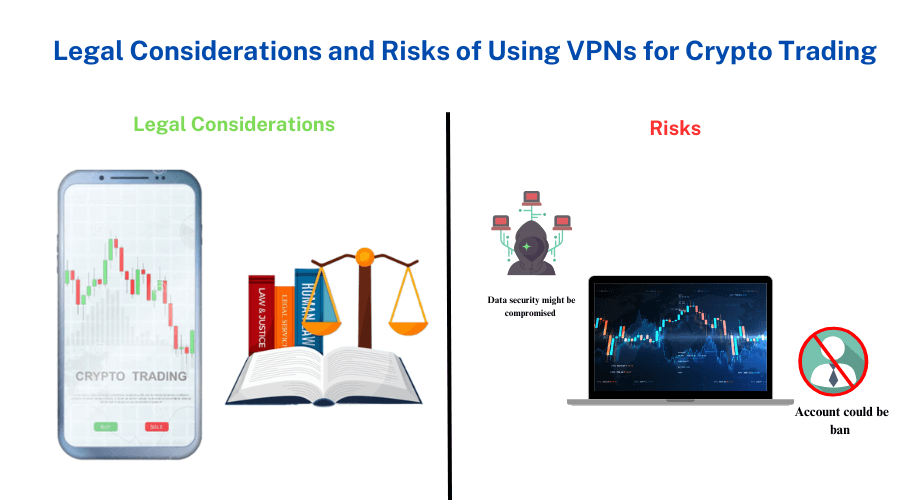
Using a VPN for crypto trading can offer significant privacy and security benefits, but it also comes with legal considerations and potential risks that traders must be aware of.
Is Using a VPN to Trade Crypto Illegal?
The legality of using a VPN for crypto trading varies by country. In some regions, using a VPN is perfectly legal, while in others, accessing certain crypto exchanges via a VPN might violate local regulations.
Countries like China and Russia have strict controls over VPN usage and cryptocurrency trading, making it risky for traders in these areas. Always check your local laws and regulations to ensure compliance.
| Region | VPN Usage for Crypto | Risk Level |
|---|---|---|
| USA | Generally Legal | Low |
| China | Restricted | High |
| Europe | Legal in most countries | Low |
| Russia | Highly Restricted | High |
| Middle East | Varies Significantly | Moderate to High |
Risks of Using a VPN with Crypto Exchanges
- Account Suspensions and Bans: Some crypto exchanges, like Binance, have service terms prohibiting VPN usage. If detected, your account could be suspended or banned, leading to losing access to funds or the inability to trade.
- Data Privacy Concerns: Not all VPNs are created equal. A free or unreliable VPN can expose your data to third parties, especially if the provider logs your activity. To avoid privacy breaches, it’s crucial to choose a VPN with a strict no-logs policy.
- Compliance Issues: Some exchanges require Know Your Customer (KYC) verification, which could conflict with VPN use. Attempting to bypass regional restrictions might lead to compliance issues, and your account could be flagged.
Compliance Challenges When Trading Crypto with a VPN
- Review Terms of Service: Before using a VPN on any crypto exchange, thoroughly review its terms of service to understand its stance on VPN usage.
- Use Reputable VPN Providers: Opt for well-known VPNs with strong privacy features and a proven track record of protecting user data.
- Stay Informed: Keep up-to-date with the legal status of VPNs and crypto trading in your region, as regulations can change rapidly.
Understanding these legal considerations and risks will help you make informed decisions when using a VPN for crypto trading, ensuring that you trade safely and within the bounds of the law.
Challenges and Solutions When Using a VPN for Crypto Trading
While using a VPN for crypto trading offers many benefits, it also has a few common challenges. Here’s a look at some of these issues and practical solutions to overcome them
| Challenges | Solutions |
|---|---|
| 1) Slow Connection Speeds | Use fast VPNs like ExpressVPN; connect to nearby servers; use WireGuard. |
| 2) VPN Detection by Exchanges | Use obfuscation features; try NordVPN’s obfuscated servers. |
| 3) Geo-restrictions and Access Issues | Choose servers in crypto-friendly regions like Switzerland. |
| 4) Device Compatibility Issues | Select VPNs with wide device support; try Surfshark for unlimited devices. |
| 5) Managing Security Settings | Use VPNs with strong default settings; CyberGhost offers easy modes. |
1) Slow Connection Speeds
VPNs can sometimes slow down your internet connection due to the encryption process and the distance between your device and the VPN server. This can be frustrating, especially when trading cryptocurrencies, where speed is crucial.
Solution: Choose a VPN provider known for its fast servers, like ExpressVPN or NordVPN. Connect to servers that are geographically closer to you, and consider using VPN protocols optimized for speed, such as WireGuard. Also, avoid using free VPNs, which often have limited bandwidth and overcrowded servers.
2) VPN Detection by Crypto Exchanges
Some crypto exchanges have started detecting and blocking VPN traffic to enforce regional restrictions or compliance with their terms of service. This can prevent you from accessing your account or conducting trades.
Solution: Use a VPN with obfuscation features, which disguise VPN traffic as regular internet traffic, making it harder for exchanges to detect. VPNs like Surfshark and NordVPN offer these stealth modes. Additionally, regularly switch server locations to avoid being flagged for consistent VPN usage.
3) Geo-Restrictions and Access Issues
Certain crypto exchanges and services may be restricted based on location, limiting your ability to trade or access your funds.
Solution: Select a VPN with a wide range of server locations, particularly in countries where your preferred exchanges operate freely. Connect to these servers to bypass geo-restrictions and access the platforms you need. Always ensure the exchange does not blacklist your chosen server.
4) Device Compatibility and Technical Setup
Setting up a VPN on multiple devices can be confusing, and not all VPNs are compatible with every device or operating system.
Solution: Choose VPNs that support various devices and offer easy-to-follow setup guides. Most premium VPNs provide apps for Windows, macOS, Android, iOS, and even browser extensions.
Managing Security Settings
With many features and settings, navigating a VPN’s interface and configuring it correctly for optimal security can be daunting, especially for beginners.
Solution: Use VPNs with user-friendly interfaces and default security settings already optimized for privacy and security. Providers like CyberGhost offer dedicated modes for specific tasks, including secure trading, which simplifies the process for users who may not be tech-savvy.
By understanding and addressing these common challenges, you can maximize the benefits of using a VPN for crypto trading while minimizing potential drawbacks.
Key Takeaways: VPN for Crypto Trading
- VPNs Enhance Privacy and Security: Using a VPN for crypto trading helps protect your identity, encrypts your data, and secures your internet connection from potential cyber threats. This is essential in an environment where privacy breaches can lead to significant financial losses.
- Legal Considerations Vary by Region: The legality of using a VPN for trading cryptocurrencies depends on your location and the specific rules of the crypto exchanges. Always review the laws in your area and the terms of service of the platforms you use.
- Understand the Risks: While VPNs offer many benefits, they also come with risks, such as account suspensions on certain exchanges if VPN usage is detected. Choosing a reputable VPN provider and staying informed about legal and compliance issues is key.
- Overcoming Challenges is Possible: Common challenges like slow connection speeds and VPN detection can be managed with the right VPN features, such as obfuscation, fast servers, and proper configuration. Select a VPN with a wide server network and strong support to navigate these issues effectively.
Final Thoughts : Is It Legal to Use a VPN for Crypto Trading
Using a VPN for crypto trading can significantly enhance your trading experience by providing privacy, security, and access to otherwise restricted platforms.
However, it’s important to navigate the legal framework carefully and choose a VPN that aligns with your trading needs and regional regulations. By understanding the common challenges and implementing the suggested solutions, you can trade more securely and confidently in the evolving crypto market.
VPNs are powerful tools that protect your digital assets and trading activities, but they must be used wisely. Stay informed, select your VPN thoughtfully, and prioritize your online security and compliance with the applicable laws.
For a comprehensive overview of the best VPNs and their specific features, don’t miss our article on The Best VPNs for Crypto Trading.
FAQs : Use a VPN for Crypto Trading
1. Can I use a VPN to buy crypto?
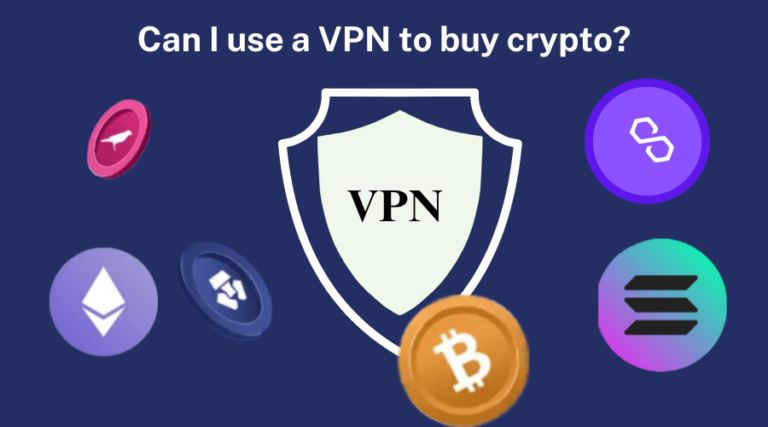
Yes, you can use a VPN to buy crypto. A VPN helps secure your connection by encrypting your data and masking your IP address, providing additional privacy when accessing crypto exchanges. It’s especially useful in regions with restrictions on crypto trading, allowing you to connect to exchanges that might otherwise be inaccessible.
2. Can I use a VPN to buy crypto from Coinbase?
Using a VPN with Coinbase can provide extra privacy; however, Coinbase’s terms of service may vary depending on your location. While a VPN can help you access Coinbase from restricted regions, be aware that VPN detection might occur, potentially impacting your ability to use the platform seamlessly.
3. Can I use a VPN to trade on Binance?
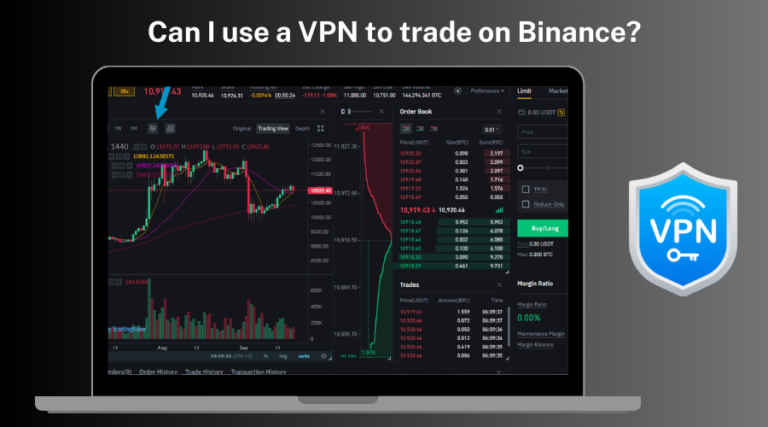
Yes, a VPN can be used to trade on Binance, particularly if you are in a region where access is restricted. You can bypass geo-restrictions by connecting to a server in a country where Binance is available. However, it’s important to note that using a VPN might violate Binance’s terms of service, posing a risk of your account suspension.
4. Can You Buy a VPN With Bitcoin Transactions?
Yes, many VPN providers, including top options like NordVPN and Surfshark, accept Bitcoin and other cryptocurrencies as payment. This allows you to maintain anonymity while purchasing the VPN service, aligning with the privacy-focused nature of crypto trading.
5. Can You Get Banned for Using a VPN With a Decentralized Exchange?
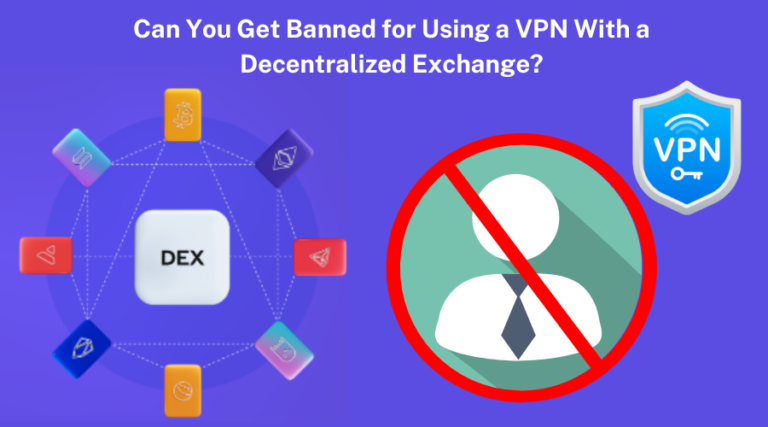
Generally, decentralized exchanges (DEXs) do not restrict VPN usage, as they prioritize privacy and decentralization. However, some DEXs or related services might have their policies, so it’s best to review each platform’s terms. While VPNs enhance privacy, always use them in accordance with the platform’s rules to avoid any potential issues.


